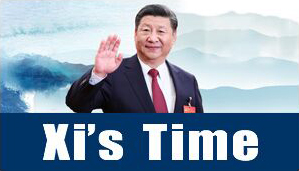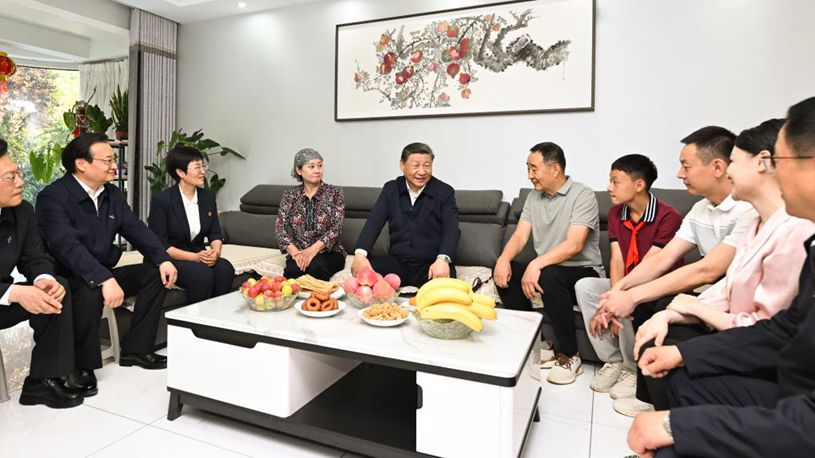YINCHUAN, June 21 (Xinhua) -- Chinese President Xi Jinping has underscored the ecological conservation and high-quality development of the Yellow River basin during an inspection tour in northwest China's Ningxia Hui Autonomous Region.
Xi, also general secretary of the Communist Party of China Central Committee and chairman of the Central Military Commission, came to Ningxia on Wednesday after wrapping up his inspection in Qinghai Province.
Situated in the Yellow River basin, Ningxia is surrounded by deserts on three sides and faces the daunting task of conserving and restoring ecosystems.
Xi asked Ningxia to coordinate high-quality development with high-level environmental protection, further reform and opening up, advance new urbanization and rural revitalization, and promote ethnic unity and common prosperity.
The autonomous region has a large ethnic minority population. On Wednesday afternoon, Xi visited a multi-ethnic residential community in the regional capital Yinchuan. Of over 18,000 residents in the community, 38 percent belong to ethnic minority groups such as Hui, Manchu, Mongolian and Tibetan.
Xi first went to the community service center and an activity room where he watched residents practice paper-cutting and dancing, and talked with them. He called for thorough, detailed and concrete efforts to address urgent needs and concerns of the residents, and deliver high-quality services to the people.
Xi then visited the home of resident Zhao Shoucheng, where he chatted with the Zhao family to learn more about things related to employment, income, medical insurance reimbursement, and children's education. "I am concerned about the well-being of every family of all ethnic groups," Xi said, extending best wishes to the Zhao family.
At the community square, Xi spoke to the residents who gathered there to greet him. Xi said he was delighted to visit Ningxia again and meet with local people of various ethnic groups.
"The Chinese nation is a big family," Xi said, calling for continued efforts to foster a strong sense of community for the Chinese nation and pool strength from all sectors to advance Chinese modernization.
On Thursday morning, Xi was briefed by the Ningxia regional committee of the CPC and the regional government on their work, and acknowledged their achievements.
Noting that Ningxia boasts unique geographic conditions and resources, Xi said the region should follow a distinctive and differentiated development path.
Ningxia should develop modern coal chemical and new materials industries, clean energy industries including wind, photovoltaic and hydrogen power, as well as its specialty industries of wine and goji berries, Xi said.
He called for more efforts to integrate scientific and technological innovation and industrial innovation, and develop new quality productive forces in light of local conditions.
Ningxia should continue to deepen the reform of state-owned capital and enterprises, facilitate the growth of the private sector, and improve the business environment, Xi said.
Xi called on the region to actively participate in the Belt and Road cooperation and the construction of the New International Land-Sea Trade Corridor, and enhance trade and economic cooperation with Arab states.
Ningxia should adopt the strictest possible management system for water resources, and strive to protect the ecosystem in the areas of the meandering bends of the Yellow River, Xi underlined.
The Yellow River, China's second-longest river, is deemed the country's "mother river." It originates from the Qinghai-Xizang Plateau and runs through the Loess Plateau, flowing about 5,464 km through Ningxia and eight other provincial-level regions.
Xi demanded concerted efforts to achieve common prosperity for people of all ethnic groups, and solid measures to ensure job opportunities for college graduates, migrant workers, and veterans.
He emphasized advancing the integrated development of both urban and rural areas and advancing rural revitalization across the board.
Xi also underlined governing ethnic affairs in accordance with the law, and building an ethnically integrated society. ■





